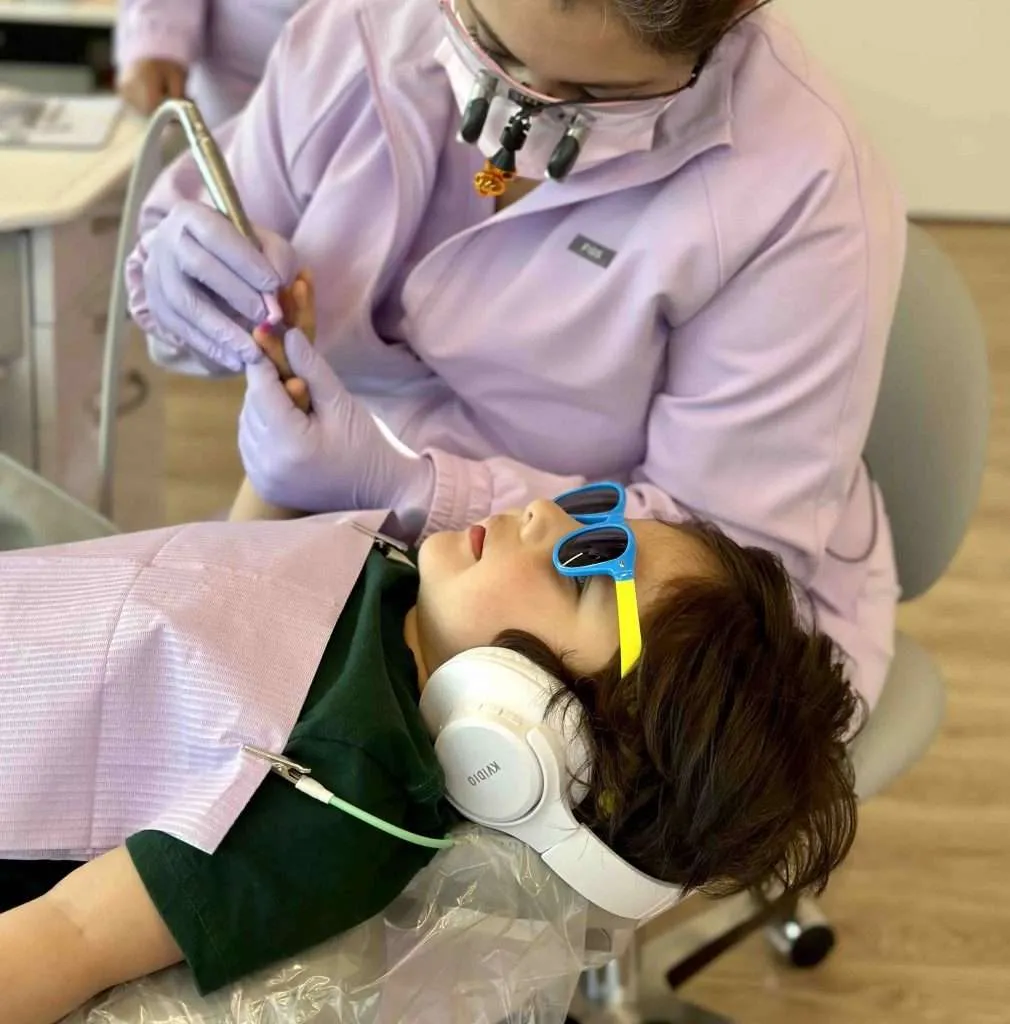Pediatric vs. general dentist: Which is best for your child? Pediatric dentists have extra training, child-friendly offices, and expertise in kids’ oral health, behavior, and special needs. General dentists treat all ages but may lack pediatric focus. Learn key differences, benefits, and how to choose for your child’s smile.
Choosing the right dentist for your child is a decision that can shape their oral health for years to come. Pediatric dentists specialize in treating kids, while general dentists care for patients of all ages. This guide helps parents and caregivers understand the differences, weigh the benefits, and decide what’s best for their child’s needs.
What Is a Pediatric Dentist?
Definition and Role of a Pediatric Dentist
A pediatric dentist is a dental professional trained specifically to care for children’s teeth, from infancy through adolescence. They handle everything from routine cleanings to complex treatments, focusing on the unique needs of growing mouths.
What Sets Pediatric Dentists Apart from General Dentists?
- Additional 2-3 years of specialized training beyond dental school
- Expertise in child behavior management and treating special needs children
- Focus on early intervention, preventive care, and guiding oral development
- Child-friendly office environments designed to reduce dental anxiety
What Is a General Dentist?
Definition and Role of a General Dentist
A general dentist provides oral care for people of all ages, including cleanings, fillings, and crowns. They’re the go-to for most adults but can also treat children, depending on their experience and comfort level.
Can a General Dentist Treat Children?
Yes, general dentists can treat kids, and many do so effectively, especially for basic care like checkups or small cavities. However, they may not have the same level of training or tools tailored to young patients as pediatric dentists do.
Key Differences Between a Pediatric Dentist and a General Dentist
Specialized Training & Education
Pediatric dentists undergo 2-3 years of residency after dental school, focusing on children’s oral health. This includes learning child psychology and techniques to manage behavior—skills general dentists typically don’t study in depth.
Child-Friendly Office Environment
Pediatric dental offices often feature colorful decor, toys, and TVs to keep kids engaged. Their equipment, like smaller chairs and tools, fits children’s mouths better than the standard setups in general practices.
Expertise in Behavior Management & Special Needs Care
Pediatric dentists are trained to calm anxious kids or those with special needs. They use distraction, positive reinforcement, or sedation when necessary—skills honed through years of working with children.
Focus on Preventive & Early Intervention Care
Starting dental visits by age 1, as recommended by the American Academy of Pediatric Dentistry (AAPD), helps catch issues early AAPD Guidelines. Pediatric dentists stress habits like brushing and diet to prevent decay.
Tailored Treatment Plans for Kids
Children’s dental needs change as they grow, and pediatric dentists are adept at creating personalized treatment plans that adapt to these changes. From teething infants to teenagers needing braces, pediatric dentists provide age-appropriate care tailored to each stage of a child’s development.
Handling Dental Anxiety and Phobia
About 20% of kids experience dental anxiety, per a 2017 study in the Journal of Dental Research, JDR Study. Pediatric dentists use child-friendly language and sedation options to ease fears.
Early Orthodontic Assessments
Pediatric dentists monitor the growth of teeth and jaws, identifying issues like crowding by age 7, which is the recommended age for an initial orthodontic evaluation, according to the American Association of Orthodontists.
Benefits of Choosing a Pediatric Dentist Over a General Dentist
Better Understanding of Children’s Oral Health Needs
Pediatric dentists know how kids’ teeth grow and change, offering care that matches each stage of development.
Advanced Knowledge of Pediatric-Specific Dental Issues
From tooth decay (affecting 42% of kids ages 2-11, per the CDC Data) to gum problems, pediatric dentists tackle issues unique to young patients.
Education and Guidance for Parents
They teach caregivers about teething, fluoride, and diet, empowering families to protect their child’s smile.
Positive Long-Term Oral Health Outcomes
Early care from a pediatric dentist reduces cavity risk and builds healthy habits, setting kids up for a lifetime of good oral health.
How to Choose the Right Pediatric Dentist for Your Child
What to Look for in a Pediatric Dentist?
Check their credentials on the AAPD website, office vibe, and experience with kids like yours—especially if your child has special needs.
Questions to Ask Before Booking an Appointment
- How do you handle nervous kids?
- What’s your approach to sedation?
- Do you accept my insurance?
FAQs About Pediatric Dentists Vs General Dentists
What Is the Difference Between a Pediatric Dentist and a General Dentist?
Pediatric dentists focus solely on kids with extra training; general dentists treat all ages with broader care.
Is it necessary for baby teeth to receive dental treatment since they will eventually fall out?
Yes, because baby teeth guide permanent teeth, aid in speech, and help with chewing. Untreated issues can cause pain, infection, and alignment problems with permanent teeth.
Can a Pediatric Dentist Treat Adults?
They can, but most stick to kids and teens, referring adults to general dentists.
How Can You Tell Whether a Dentist Is a Pediatric Dentist?
A pediatric dentist will typically have a DDS (Doctor of Dental Surgery) or DMD (Doctor of Dental Medicine) degree and additional training and certification in pediatric dentistry.
Another credential to look for is whether the dentist is board-certified in pediatric dentistry. Being board certified means the dentist has undergone a rigorous examination process administered by the American Board of Pediatric Dentistry (ABPD).
Is It Necessary to Visit a Pediatric Dentist or Will a General Dentist Do?
For basic care, a general dentist may suffice. For complex needs or young kids, a pediatric dentist is ideal.
At What Age Should My Child First See a Dentist?
Your child should visit a pediatric dentist by their first birthday or within six months of their first tooth erupting or when the first tooth appears, per AAPD advice.
Do Pediatric Dentists Cost More Than General Dentists?
Not necessarily, costs vary by location and insurance.
How often should my child visit a pediatric dentist?
Children should see the dentist every six months for check-ups and cleanings to monitor dental development and maintain oral hygiene.
What can I do to prepare my child for their first dental visit?
Talk positively about the dentist, read books, watch videos about dental visits, or let them accompany you to your appointments to ease any fears. Learn more here.
How do pediatric dentists handle children who are anxious or fearful?
Pediatric dentists use behavior management techniques like tell-show-do, positive reinforcement, and distraction to help children feel comfortable and relaxed.
What preventive treatments do pediatric dentists offer?
They offer fluoride treatments, dental sealants, and guidance on nutrition and oral hygiene to protect your child’s teeth from decay and ensure proper development.
Final Thoughts: Is a Pediatric Dentist the Right Choice for Your Child?
When to Choose a Pediatric Dentist Over a General Dentist
Opt for a pediatric dentist if your child is young, anxious, or has special needs requiring expert care.
How Pediatric Dentistry Leads to Better Lifelong Oral Health
With early visits, tailored treatments, and parental guidance, pediatric dentists help kids avoid problems like cavities—42% of which could be prevented with proper care (CDC). Their focus builds a strong foundation for a healthy smile into adulthood.



